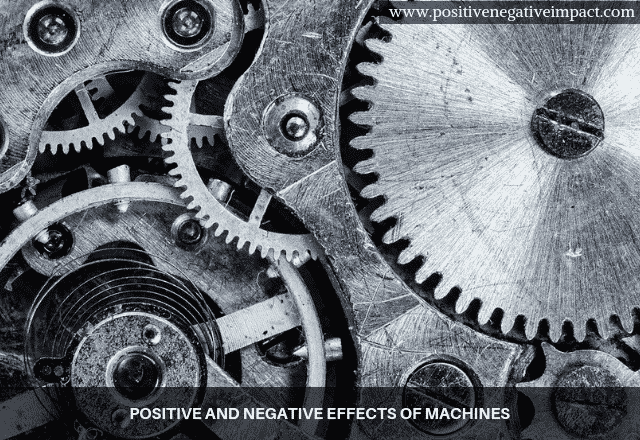Machines have attained a high level of priority in this modern era. It has occupied key significance in the common man’s life. Machines offer the best assistance to men in all walks of life.
It enhances the life of a person. When used properly, innumerable electronics and devices provide a lot of comfort to man. Though there are several positive effects from machines, there are many negative effects as well.

Positive Impact
Enhances the quality of life
Living a life without machines is next to impossible. We have all become dependent on machines. From the moment our alarm goes off, to taking a hot shower, and enjoying a slice of toast, machines make our day easier.
We can travel across the planet in hours via planes. People can call a family member instantly. Thousands of movies are a click of a remote away through streaming services. Machines have completely defined all of the comforts we have today.
More Spare Time
Machines have drastically increased productivity, allowing people to work shorter hours. Instead of working sunrise to sunset, we work 40 hours and have weekends off with even better outputs. It is thought by many that in the future, we may only have to work 10 – 20 hours a week.
Quick and Accurate Work:
With billions of consumers, production speed is important. Machines allow is to quickly produce goods often in seconds, keeping up with worldwide demands.
Not only are the goods produced quickly, but machines remove human error from the equation. Substandard goods create less waste, and end products are much safer with fewer defects.
Less strain On Humans
Modern machines are safer and cause less strain on the human body. As a result, the number of fatal and non-fatal injuries have decreased. Even in the last twenty years, workplace injuries in the US have been cut in half.
Cheaper Goods
Machinery helps in the large-scale production of goods in just a few minutes. It requires less infrastructure and labor to perform the work. In this way, it results in the manufacture of cheaper goods.
Negative Effects Of Machines
Sets monotony:
Machines create monotonous work. Many workers only need to perform a few redundant mechanical operations throughout the day. It has resulted in an increase in depression and boredom.
Physical Labor Decreasing
At one point, people have to physically perform different day to day tasks. This used to keep them healthy. Now, with the use of machines, most of the works gets done with just a click of a button. Due to lack of physical exercise, the chances of obesity and other associated issues have increased.
Skilled Labor Shifting
Labor that was skilled decades ago is slowly shifting to other sectors. Manufacturing is one area that has been especially hard hit. In 1960 manufacturing jobs made up 28% of total employment. Today, it sits at only 8% of total employment. If people can’t adapt, they will be left behind as we’ve seen in large chunks of the midwest United States.
Dependency:
We are completely dependent on machines for most basic human needs. We’re able to support 7 billion people on our planet because of agricultural technology. Small service disruptions are not only convenient but dangerous.
Environmental Destruction:
Machines have made us more efficient and destroying natural habitats. We’re so efficient at destroying forests, that the earth now has 46% of the total number of trees that existed in the beginning of human history. The extinction period we’re living in is a direct result of humans developing machines over the last few centuries.
Unemployment:
Machines can perform tasks more efficiently than humans. As a result, millions of people have been pushed out of their careers. In the UK alone, it is estimated that 1 in 5 jobs will soon be lost to automation. As unemployment rises, so will poverty and inequality.
- Tulip Mania – The Story of One of History’s Worst Financial Bubbles - May 15, 2022
- The True Story of Rapunzel - February 22, 2022
- The Blue Fugates: A Kentucky Family Born with Blue Skin - August 17, 2021
